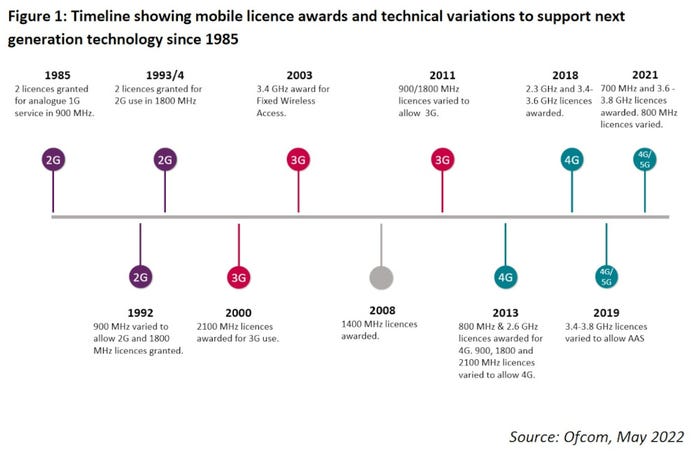Ofcom wants to let Vodafone and O2 refarm 4G spectrum for 5GOfcom wants to let Vodafone and O2 refarm 4G spectrum for 5G
UK telco watchdog Ofcom wants to alter some of O2's and Vodafone's spectrum licences so they can reuse frequencies they already have for 5G.
May 23, 2022

UK telco watchdog Ofcom wants to alter some of O2’s and Vodafone’s spectrum licences so they can reuse frequencies they already have for 5G.
The regulator late last week launched a consultation in response to requests from the two operators to make spectrum they hold in the 900 MHz, 1800 MHz, 2100 MHz, and 2.6 GHz bands technology neutral. Freeing up more spectrum would help Voda and O2 close the gap on EE and Three, which have successively laid claim to having the country’s biggest and fastest 5G network.
Given that consumers and businesses alike are forever clamouring for more capacity, Ofcom said it is minded to give O2 parent Telefónica and Vodafone its blessing. Just to make sure though, it wants some feedback from the industry before proceeding. Depending how the consultation goes, it will offer the same changes to the likes of EE and Three.
“Our policy goal is to remove the regulatory barriers that prevent the deployment of the latest available technology, where appropriate,” said Ofcom, in its consultation document. “In considering Vodafone’s and Telefónica’s requests, we have therefore aimed to ensure that their licences are as technology neutral as possible and contain provisions to allow the networks to deploy 5G whilst ensuring other users are protected from undue interference.”
Ofcom has also proposed a further amendment to O2’s unpaired 2.6-GHz licence to remove restrictions on frequencies adjacent to Vodafone’s unpaired 2.6-GHz spectrum. Doing so would enable O2 to make use of an extra 5 MHz of spectrum, giving it 20 MHz in total. To avoid interference, O2 and Vodafone would have to synchronise transmissions; Ofcom said Voda is already on board with this idea.
“Due to developments in technology and both parties reaching an agreement, we are minded to agree to Telefónica’s request to relax this condition to allow Telefónica to make better use of its 20 MHz spectrum allocation,” Ofcom said.

Spectrum refarming is nothing new in the UK – the 900 MHz band was originally used for analogue mobile services nearly 40 years ago – but it can serve to illustrate how mobile technology and spectrum availability is progressing. For instance, 11 years ago, 900 MHz and 1800 MHz licences were modified so operators could refarm the spectrum for 3G, but just two years later, those same licences were altered again to allow for 4G, suggesting rapid migration to 4G and scarcity of spectrum.
Since then, more frequency bands have been allocated for mobile services, so there hasn’t been the same pressure during the intervening nine years to reuse existing spectrum. This new Ofcom consultation suggests that picture is now changing.
As previously mentioned, Ofcom said its job is to remove regulatory barriers to high-speed network deployment, so it must have been particularly pleased with itself last Friday when it also revealed new stats on Gigabit broadband availability.
According to the watchdog, Gigabit speeds are now within reach of 66 percent of all UK homes, which is 19.3 million to be slightly more precise. This time last year, that figure stood at 37 percent. Full fibre broadband is doing well too. Ofcom said coverage has now reached 33 percent of households, up from 21 percent in May 2021.
“Our rules encourage companies to invest in improving their networks, and we’re now seeing a real race to roll out faster Internet to people across the UK,” said Lindsey Fussell, Ofcom’s group director of network and communications, in a statement.
“But faster needn’t mean bigger bills,” she continued. “Full fibre packages are on offer for around £25 per month, so you can boost your broadband without paying a packet.”
In terms of high-speed mobile coverage around 92 percent of the UK’s landmass is now thought to be covered by 4G, and around half of UK homes are covered by at least one 5G provider. If Ofcom’s refarming consultation is well received – and there’s nothing to suggest it won’t be – then the pace of that 5G rollout is likely to pick up.
About the Author
You May Also Like










.png?width=300&auto=webp&quality=80&disable=upscale)


_1.jpg?width=300&auto=webp&quality=80&disable=upscale)